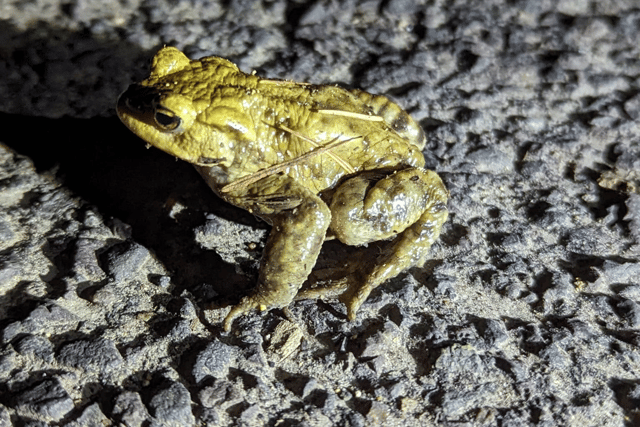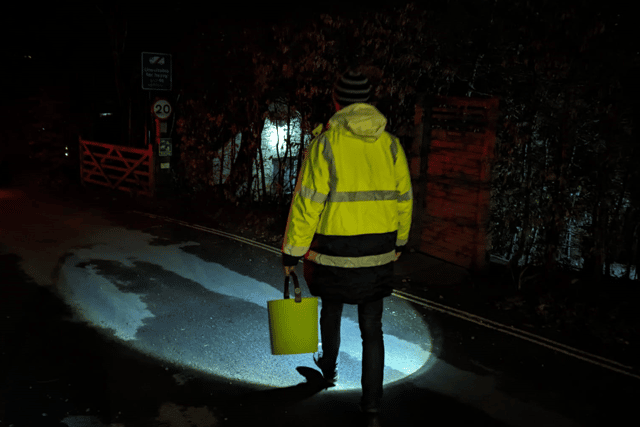'Toad Patrol': How to help your local amphibians - as British frogs and toads begin their annual migration
and live on Freeview channel 276
Across the British Isles, native toads are on the move - and they need your help.
Charlcombe Lane, a popular local shortcut in Bath, has just closed for the next six weeks to help protect the local toad population, as they wake up from their winter slumber and hit the streets - en route to a local breeding pond. The annual street closure is the result of close work between nature-loving volunteers and local authorities, but amphibians aren't just at risk in Bath.
Advertisement
Hide AdAdvertisement
Hide AdUK-wide, frogs, toads, and newts are embarking on migrations in search of food, mates, and a safe spot for their young - and so-called 'toad patrols' across the country need volunteers to help them on their way. NationalWorld spoke to Charlcombe Toad Rescue Group volunteer Mike Collins about what a huge difference toad patrols can make, and what you can get out of taking part.


'An immediate impact'
There have been people helping amphibians cross the street in Charlcombe since the 1980s, but it wasn't until the early 2000s that volunteers were able to negotiate closing the lane. But with residents and the odd cheeky interloper still using the road, the patrol is still out night after night with torches, high-vis, and buckets, scooping up toads and taking them to safety.
Charlcombe Lane is special, in that frogs, toads, and newts all use it, Mr Collins said. On average, about 2,500 amphibians will cross the lane each year, and at least half of them will be toads. "Newts are the trickiest to spot because they're so small," he said. "They look very much like twigs."
Mr Collins said the road closure had an "immediate impact" on the local amphibian population. The casualty rate fell from roughly 65% of those who traversed the road to just 7% the very first year, and now sits at about 3 to 4%. With the Bath and North East Somerset Council's support, it was now "probably one of the most significant amphibian migration sites in the country".
Advertisement
Hide AdAdvertisement
Hide Ad"We've always had lots of support from the local council and councillors, and the community... It's just building up those conversations," he said. But still, year on year, the group had to submit an application for the annual road closure. Thankfully, the UK government recently announced changes to make it easier for local authorities to protect small wildlife on British roads - a promising sign for the volunteers who care about them.


Nature in trouble
The most recent State of Nature report found that one in six species in the UK was facing extinction. But this is exactly why toad patrols are so important, Mr Collins said. "Given the challenges the natural world faces, anything you can do to help makes a difference.
"From a few dozen [amphibians] to thousands, it all makes a difference to the local population," he continued. The benefits to volunteers and wildlife alike are two-fold. "One, you're in effect becoming a citizen scientist... You're contributing to the bigger picture of what's happening with amphibians."
All of the data on numbers and species collected by toad patrols goes to conservation charity Froglife, and it has helped create likely the UK's only large-scale dataset on common toads. Mr Collins said volunteers are also contributing to "conservation in action" - and it can give a real sense of doing something positive for the environment, at a time when it's easy to feel overwhelmed.
Advertisement
Hide AdAdvertisement
Hide AdMike said when he was young, he remembered seeing hedgehogs everywhere. But now the species is listed as vulnerable to extinction on the Red List for Britain’s Mammals, and campaign group Hedgehog Street says up to 75% of the population has disappeared in some parts of the countryside. "These species, which were really widespread, are becoming rarer," he said, and human impact is playing a big part in that.
"That's why we should care - we've got to right that wrong." Toad patrols really show you that change is possible, he said. "It's how it makes you feel. When you see a frog on the tarmac, and a car is coming and it starts hopping off, and you catch it... It's dark, the owls are hooting, it just reconnects you with nature."
How can I volunteer at a toad patrol near me?
There are dozens of evening toad patrols taking place all across the UK throughout February and March. Froglife has a handy online tool here, which allows to enter your postcode and find ones in your area.
Patrols marked with a green-coloured toad on the map are active, with amphibians on the move now and an active patrol. If you click 'Offer to help', it will tell you how to get in touch with organisers so you can volunteer. If the area is marked with a purple toad, toads are crossing but there is currently no active patrol. If you'd be eager to organise one yourself in these areas, you can email [email protected] noting the name and ID number.
Finally, yellow toads mean details for that crossing are currently unknown. If you're a local and you have information about it, Froglife also encourages you to get in touch and let them know.
Comment Guidelines
National World encourages reader discussion on our stories. User feedback, insights and back-and-forth exchanges add a rich layer of context to reporting. Please review our Community Guidelines before commenting.
